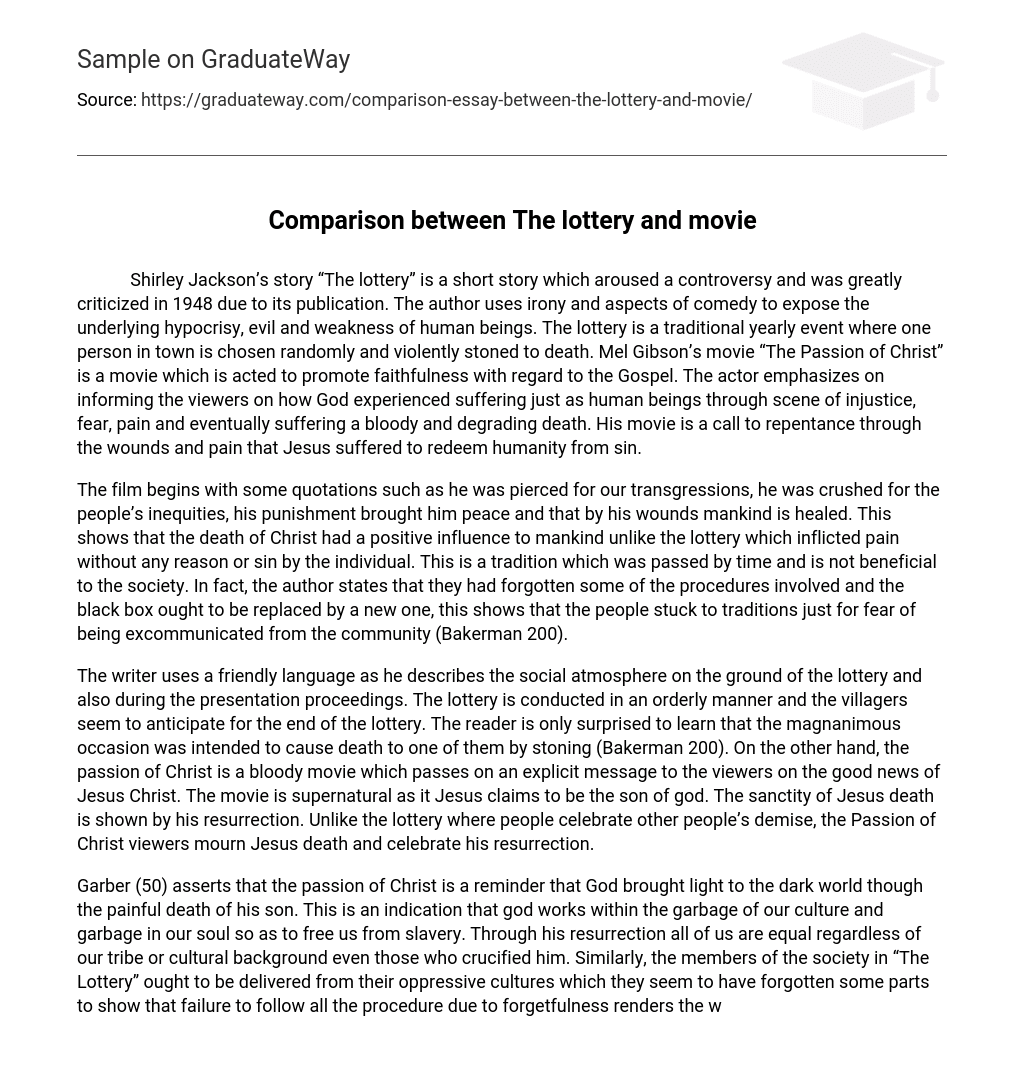Shirley Jackson’s story The Lottery” is a short story that caused controversy and received significant criticism upon its publication in 1948. The author uses irony and comedic elements to expose the underlying hypocrisy, evil, and weakness of human beings. The lottery is a traditional yearly event where one person in town is randomly chosen and violently stoned to death.
Mel Gibson’s movie “The Passion of Christ” promotes faithfulness with regard to the Gospel. The actor emphasizes informing viewers how God experienced suffering just like humans through scenes of injustice, fear, pain, and eventually suffering a bloody and degrading death. His movie calls for repentance through the wounds and pain that Jesus suffered to redeem humanity from sin.
The film begins with several quotations, such as He was pierced for our transgressions, he was crushed for the people’s inequities, his punishment brought him peace,” and “By his wounds mankind is healed.” These quotes demonstrate that the death of Christ had a positive influence on mankind, unlike the lottery which inflicts pain without reason or sin by the individual. The lottery is a tradition that has been passed down through time but is not beneficial to society. In fact, the author suggests that some of the procedures involved have been forgotten and that the black box should be replaced with a new one. This shows that people stick to traditions out of fear of being excommunicated from their community (Bakerman 200).
The writer uses a friendly language to describe the social atmosphere during the lottery and presentation proceedings. The lottery is conducted in an orderly manner, and the villagers seem to anticipate its end. However, readers are surprised to learn that this magnanimous occasion was intended to cause death by stoning to one of them (Bakerman 200). In contrast, The Passion of Christ is a bloody movie that delivers an explicit message about Jesus Christ’s good news. The movie is supernatural as Jesus claims to be the son of God, and his resurrection shows the sanctity of his death. Unlike in the lottery where people celebrate others’ demise, viewers of The Passion of Christ mourn Jesus’s death and celebrate his resurrection.
According to Garber (50), the passion of Christ serves as a reminder that God brought light to a dark world through the painful death of His son. This indicates that God works within the garbage of our culture and souls in order to free us from slavery. Through His resurrection, we are all equal regardless of our tribe or cultural background, even those who crucified Him. Similarly, in The Lottery,” society members should be delivered from their oppressive cultures which they seem to have forgotten certain parts of. Failure to follow all procedures due to forgetfulness renders the entire procedure meaningless and weak.
Both the short story and the movie feature characters who oppose the events taking place. In the movie, Pontius Pilate is portrayed as a non-violent governor of history, displaying traits of a civilized and humane leader who is burdened by power. He repeatedly attempts to save Jesus from crucifixion, which was demanded by the priests (Garber 51). However, his efforts were in vain as public demand for Barabbas’ release and Jesus’ crucifixion had to be met. According to Bakerman (201), Jackson uses Mrs. Hutchinson’s character to represent individuals in society consumed by weakness and hypocrisy who fail to stand up against uncivilized beliefs. Mrs. Hutchinson arrives late and claims she forgot what day it was due to her numerous house chores; she further voices concerns that her family will draw the paper with a black dot. She continues complaining about the unfairness of the ritual until her death. It is evident that in any society where unjust activities occur, some people are opposed but lack autonomy due to fear of authority.
The Passion of Christ is a beautiful but brutal movie, which is a masterpiece of cinematic art. The movie is generally gut-wrenching, excruciating, and emotionally draining. It depicts the last twelve hours of the life of Jesus Christ in shockingly violent detail (Garber 52). The movie was not made for entertainment purposes; Mr. Gibson’s real intention was for the audience to identify with Jesus. Similarly, the story reflects the author’s literary skills with the aim of depicting weaknesses in human nature and baseless traditions. He creates suspense throughout the story by mixing anxiety and fear in a way that keeps readers guessing about what this lottery really means. Jackson gives a wake-up call to humanity to disapprove and do away with norms and traditions that are not in accordance with religious beliefs.
The short story and the movie share similarities and differences as they both offer a similar perspective on the society we live in. Jesus was killed due to the selfishness of the high priests, while Mrs. Hutchinson died due to her primitive society following a tradition passed down over time. The author and actor both call upon people to embrace change, just as Jesus did on the cross, saving mankind from sin.
Works Cited
Bakerman, J. And Then There Were Nine: More Women of Mystery. Popular Press Publishers, 1985.
Garber, Z. (2006). Mel Gibson’s Passion: The Film, The Controversy and Its Implications. Boston: Purdue University Press.





